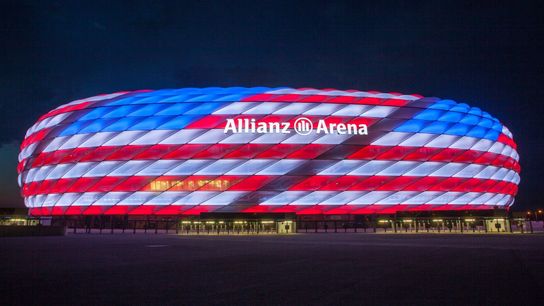The NFL's plan for world domination is hitting its next stage.
The league announced Wednesday it will play its first regular season game in Germany this coming season, exporting a to-be-determined contest to Allianz Arena, the 75,000-seat home of FC Bayern Munich. The league will play one game in Germany per year through 2025; two games will be in Munich and two in Frankfurt.
"We are very pleased to welcome Munich and Frankfurt to the NFL family and are excited to reward our fans in Germany for their passion by bringing them the spectacle of regular-season NFL football," Roger Goodell said in a statement.
The move to Germany is a long time coming in many ways. By the time NFL Europe closed in 2007, five of the league's six teams were based in Germany.
Germany is also Europe's largest economy, trailing only the US, China and Japan worldwide at $3.85 trillion. Its population of nearly 84 million trails only Russia for the most in Europe, and its five active players are the most in Europe.
And then there's this: according to league data, the NFL is more widely watched in Germany than the NHL is... in America. While England has the more American-expat football fans than any other nation, it seems Germany leads the world in football fans born and raised in a foreign country.
For that reason, instead of having to tell teams they're playing in Europe, the NFL could find itself having to disappoint teams by telling them they won't play in the initial German game.
That's because of how the league has chosen to pursue the foreign market. Instead of allowing the game to grow organically overseas, a la what the English Premier League has done over here, the NFL has chosen to corporatize its growth. As one executive told Sports Illustrated last spring:
Teams will have to have a detailed plan for what they’ll do (marketing, youth outreach, partnering with soccer teams, etc.), and why they should be awarded the market. The goal, Halpin says, is to, over time, assign about six teams to the league’s major international markets (they’ll be bidding on entire countries, not parts of it), and have those teams’ efforts complement one another.
“So Team A will come forward and say, ‘I will have this level of player trips, I’ll do a youth football camp, I’ll co-market with the local soccer team or whatever, and I may build a facility there,’ ” Halpin said. “‘I can then sell sponsorships so I can extend my airline or hotel partnerships to Germany, so they can generate revenue to cover those investments and in a host of other things.’ All we care about on this is fan development. This isn’t dollars and cents [for the league office] in the grand scheme of things.”
In typical NFL thinking, rather than let the citizens of Munich, Frankfurt and Berlin choose their teams on their own terms, the league will try to dictate Giants (or Packers, or 49ers) fandom to the entire nation through Delta miles and Marriott points.
Either way, Germany stands as the No. 1 football hotbed outside American borders, and so this fall's Munich game will be a cornerstone moment of the 2022 season. So it stands to reason teams will try to position themselves into the Munich game, especially with a 17-game schedule, where they're still guaranteed eight home games.
That's not to say the NFL is putting all its international eggs inside Allianz Arena, however. The league will play three London games -- two neutral site games at Tottenham Hotspur Stadium, one Jaguars home game at Wembley -- and one in Mexico.
Germany is the next frontier, but it's not the last. Japan, Australia, Africa and South America are next.
